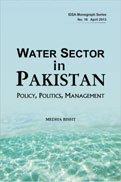Water Sector in Pakistan: Policy, Politics, Management
 This monograph undertakes a descriptive analysis of the water sector in Pakistan and underlines issues related to Pakistan’s water policies, politics and management practices. While the thematic focus is on developing linkages between the British colonial legacy – the creation of canal colonies in west Punjab, the impact of partition on the Indus Water Treaty and Pakistan’s water sector, the study explains why Pakistan followed a technocratic paradigm to manage its water resources. As societal norms play an influential role in water distribution and allocation, the monograph highlights the interface between policy and politics. It argues that domestic water management is perhaps one of the key areas which requires urgent attention in Pakistan.
This monograph undertakes a descriptive analysis of the water sector in Pakistan and underlines issues related to Pakistan’s water policies, politics and management practices. While the thematic focus is on developing linkages between the British colonial legacy – the creation of canal colonies in west Punjab, the impact of partition on the Indus Water Treaty and Pakistan’s water sector, the study explains why Pakistan followed a technocratic paradigm to manage its water resources. As societal norms play an influential role in water distribution and allocation, the monograph highlights the interface between policy and politics. It argues that domestic water management is perhaps one of the key areas which requires urgent attention in Pakistan.
About the Author
Dr Medha Bisht is Assistant Professor at the Department of International Relations, South Asian University, New Delhi. Before joining SAU, she was Associate Fellow at IDSA, with the South Asia Cluster. She studied International Relations from Jawaharlal Nehru University and holds a doctorate from the Diplomatic and Disarmament Studies Division, JNU, New Delhi. Her area of interests are South Asian Politics, particularly Bhutan, international negotiations, political and strategic thought, state-society interface and strategic dimensions of non-traditional security issues. She has widely published and presented papers at national and international fora. Some of her recent publications include: Bhutan-India Power Cooperation: Benefits Beyond Bilateralism, Strategic Analysis, 36 (5), September 2012, Routledge and Bhutan and Climate Change: Identifying Strategic Implications, Contemporary South Asia, 2013 (forthcoming), Routledge.
Download Monograph
Order Hard Copy
Please email us at publication [at] idsa.in or call +91-11-2671 7983 (Ext. 7303)








